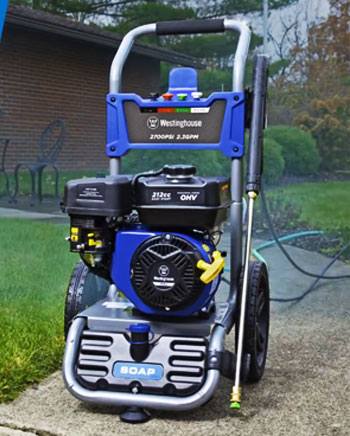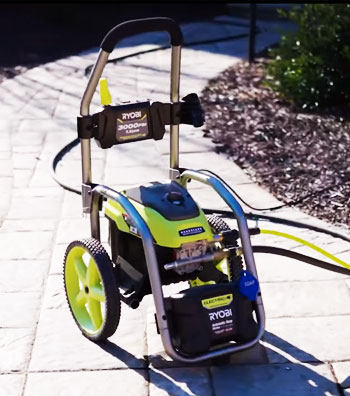Pressure washers are powerful cleaning tools that use pressurized water to remove dirt, mold, grime, and stains from surfaces like concrete, siding, decks, cars, and more. Westinghouse and Ryobi are two popular brands of electric pressure washers suitable for home use.
This article provides a comprehensive comparison of Westinghouse and Ryobi pressure washer models, examining the specifications, features, performance, and overall pros and cons of each brand. Read on to learn which is the better buy for your cleaning needs and budget.
A Brief Comparison Table
| Feature | Westinghouse | Ryobi |
| Price Range | $150 – $500 | $100 – $350 |
| PSI Range | 1300 – 3200 PSI | 1600 – 3200 PSI |
| GPM Range | 1.2 – 2.5 GPM | 1.2 – 2.3 GPM |
| Power Source | Electric | Electric |
| Weight | 30 – 50 lbs | 25 – 45 lbs |
| Warranty | 1-2 years | 3 years |
| Accessories Included | Varied by model | Varied by model |
| Ease of Use | Moderate | Very easy |
| Durability | Moderate | Good |
Overview of Westinghouse Pressure Washers
Westinghouse is a well-known brand for home appliances and offers a range of residential electric pressure washers.

Key Features:
- PSI levels from 1300 to 3200 for light to heavy duty cleaning
- Flow rates between 1.2 to 2.5 gallons per minute
- Lightweight and compact designs around 30-50 pounds
- Powered by 120V electric motors with up to 2 HP
- Removable detergent tanks on some models
- 25-50 foot power cords with GFCI protection
- Brass garden hose connectors and quick connect nozzles
- 1 to 2 year limited warranties
Westinghouse pressure washers provide adequate power for most homeowners’ cleaning needs. They are relatively affordable, lightweight, and easy to maneuver. Most models have handy onboard storage for accessories and detergent tanks for applying soaps and cleaners. The electric motors are fairly quiet.
While Westinghouse washers won’t match the performance of top gas-powered models, they make a solid choice for cleaning decks, patios, driveways, cars, grills, and other outdoor surfaces. The higher-end units can handle tough jobs like stripping paint and grime off siding.
Overview of Ryobi Pressure Washers
Ryobi offers a selection of electric pressure washers designed for DIYers and home use.
Key Features:
- PSI levels from 1600 to 3200 for handling light to heavy duty projects
- Flow rates between 1.2 to 2.3 gallons per minute
- Compact and portable designs weighing 25-45 pounds
- Powered by 120V electric motors up to 2 HP
- Onboard detergent tanks on some models
- Hose and cord reels for easy storage
- 25 to 35 foot power cords with GFCI protection
- Brass garden hose connectors and quick connect spray tips
- 3 year limited warranty
Ryobi pressure washers provide residential cleaning power in a lightweight, easy-to-use package. They are affordably priced for most homeowners. The electric motors run quietly and are more energy efficient than gas models.
Ryobi models offer handy design features like detergent tanks, swiveling nozzles, and built-in hose and cord reels. The foam cannon accessories can easily apply cleaning solutions to boost cleaning performance.
These washers work well for routine outdoor cleaning tasks like washing cars, decks, patios, and lawn equipment. Higher-end units can handle exterior surfaces like siding and concrete.
Also Read: Comparison Between Karcher K1700 and Sun Joe SPX3000
Key Differences Between Westinghouse and Ryobi pressure washers
Now let’s take a detailed look at how Westinghouse and Ryobi pressure washers compare across some key factors:
Cleaning Power
When it comes to cleaning power, both Westinghouse and Ryobi offer similar PSI and GPM across their electric pressure washer lines.

- PSI: The max PSI ranges from 1300 to 3200 for both brands. Higher PSI enables deeper cleaning of tough stains and grime. Light duty models have 1300-1800 PSI, medium duty 2100-2800 PSI, and heavy duty 3000+ PSI.
- GPM: The gallons per minute ratings range from 1.2 to 2.5 GPM for Westinghouse and 1.2 to 2.3 GPM for Ryobi. GPM measures the volume of water flow. Higher GPM boosts cleaning efficiency.
The max PSI and GPM determine the overall cleaning power. Many comparable models between the two brands offer the same 2000-3200 PSI and 1.2-2.0 GPM specs suitable for most residential cleaning tasks.
In real world performance, both brands deliver similar cleaning capabilities with adequate power to handle outdoor cleaning projects. The higher-end Westinghouse and Ryobi models with 3000+ PSI and 2.2+ GPM can take on the toughest jobs like stripping paint, cleaning concrete, and more.
Design and Handling
Westinghouse and Ryobi pressure washers share similar compact, lightweight designs for easy handling:
- Size: They have roughly the same footprint around 18-24 inches long by 10-12 inches wide. The compact sizes allow for easy storage in sheds and garages.
- Weight: The units range from about 30-50 pounds. Ryobi’s washers tend to be on the lighter end at 25-35 pounds for better portability, while some Westinghouse models are bulkier.
- Wheels: Most models have two large rear wheels for maneuverability over surfaces. A few lighter units lack wheels. Wheels make a big difference for mobility and ease of use.
- Ergonomics: Both brands design the washers for easy handling with rear wheels, onboard hose and cord hooks, and conveniently placed controls. Ryobi offers better overall ease of use.
For storage and maneuverability, Ryobi pressure washers tend to have a slight edge with smart space-saving designs. But both brands offer decent portability.
Features and Accessories
Westinghouse and Ryobi offer similar helpful features and accessories:
- Detergent Tanks – Many models include an onboard detergent tank with 20-40 oz capacity. This allows you to apply soaps and cleaners directly. Ryobi’s tanks are easier to access.
- Wands and Nozzles – A 24-35 inch wand with ergonomic grip comes standard along with adjustable nozzles (0o, 15o, 40o). Ryobi often includes 5 quick connect nozzles for more spray pattern options.
- Hose Reels – Some models have an integrated reel to easily manage the high pressure hose. This makes clean up quick and convenient.
- Foam Cannons – Special nozzle accessories that attach to the wand to dispense thick cleaning foam. Ryobi is more likely to include a foam cannon.
- Surface Cleaners – Rotating surface cleaner attachments help wash flat areas faster. Ryobi bundles these more frequently.
Overall, Ryobi includes a few more useful accessories out of the box while Westinghouse packages are more basic. Ryobi’s foam cannons and surface cleaners improve cleaning efficiency.
Durability and Reliability
For durability and reliability:
- Construction – Both brands use durable plastic housing that resists impact and weathering. The pumps and motors are designed for long service life. Ryobi washers seem a bit sturdier overall.
- Hoses – The flexible, steel reinforced hoses are kink-resistant and withstand pressure up to 3000+ PSI. Ryobi often uses thicker, non-marring hoses.
- Pumps – The axial cam and triplex plunger pumps have brass heads and maintain constant pressure with minimal pulsation or fluctuation. Ryobi offers upgrade pumps on some models.
- Motors – Powerful 120V universal motors deliver 1.5-2 HP with overload protection. Some Westinghouse motors seem underpowered.
- Warranty – Westinghouse offers 1-2 years coverage while Ryobi provides a 3 year warranty. This suggests Ryobi is more confident in long term reliability.
For the most part, both brands build reliable electric pressure washers. But Ryobi’s 3 year warranty and more heavy duty components like hoses and pumps give it the edge for durability.
Ease of Use
In terms of ease of use and convenience:
- Assembly – Basic assembly is required out of the box. Ryobi washers tend to have simpler and faster setup with intuitive instructions.
- Controls – Both have user-friendly controls. Ryobi places them more ergonomically. The best are adjustable detergent dials.
- Handling – Ryobi’s lighter weights, swiveling nozzles, and more wheels improve mobility. Storage is easier too with built-in cord and hose reels.
- Noise – The electric motors operate at comfortable noise levels. Ryobi engines run a bit quieter and smoother.
- Accessories – Ryobi includes more useful accessories like foam cannons and surface cleaners that simplify usage.
Overall, Ryobi pressure washer designs offer better usability with smart ergonomics, storage options, and accessories. Westinghouse washers still work well but aren’t quite as user-friendly.
Westinghouse Pros & Cons
Pros
- Delivers adequate residential cleaning power
- Affordable pricing for most budgets
- Lightweight and compact for storage
- Onboard detergent tanks on some models
- Enough accessories for basic cleaning needs
Cons
- Not as durable or reliable as other brands
- Motors seem underpowered at times
- Design not as intuitive or ergonomic
- Lacks convenience features of Ryobi models
- Short 1-2 year warranty periods
RyobiPros & Cons
Pros
- Provides strong cleaning performance
- Very lightweight and portable
- Excellent ergonomics and ease of use
- Lots of convenient features like hose reels
- More accessories included for better value
- Reliable and durable construction
- Long 3 year warranty for peace of mind
Cons
- Plastic housing feels flimsy to some users
- Not designed for heavy commercial use
- Higher price tags than Westinghouse
Frequently Asked Questions (FAQs)
Yes, Ryobi is known for making high quality pressure washers. They offer excellent cleaning power paired with smart designs focused on portability, ergonomics, and ease of use. Ryobi pressure washers are durable, packed with features, and a good value for homeowners.
For residential use, Ryobi, Sun Joe, and Greenworks make some of the best electric pressure washer models in terms of affordability, cleaning performance, reliability, and ease of use. Gas-powered brands like Simpson, Generac, and Karcher lead for commercial grade pressure washers.
According to most reviews and customer experiences, the top 5 pressure washer brands overall are: Simpson – Top rated for power and durability, Generac – Excellent for heavy duty commercial use, Ryobi – Best electric washers for home use, Sun Joe – Most affordable electric washers, Karcher – Leading electric and gas-powered models.
Karcher is the most popular German brand of both electric and gas pressure washers. They are designed for power and performance, making them ideal for commercial applications. Karcher is known for innovation and makes pressure washers in a wide range of sizes and types.
Final Thoughts
For most homeowners, Ryobi and Westinghouse both provide capable electric pressure washers to handle routine cleaning jobs. Models from both brands offer similar specs and performance.
However, when it comes to design, durability, and ease of use, Ryobi pressure washers come out ahead. They are lighter, easier to maneuver, have better storage, include more accessories, and are backed by longer warranties. While a bit more expensive, Ryobi washers deliver a better overall user experience.
Westinghouse pressure washers remain a decent budget-friendly option for basic cleaning needs. But Ryobi washers are worth the extra investment for a unit that will last longer and be more user-friendly over time. Focusing on your specific cleaning needs and budget will determine which brand is the better buy.

